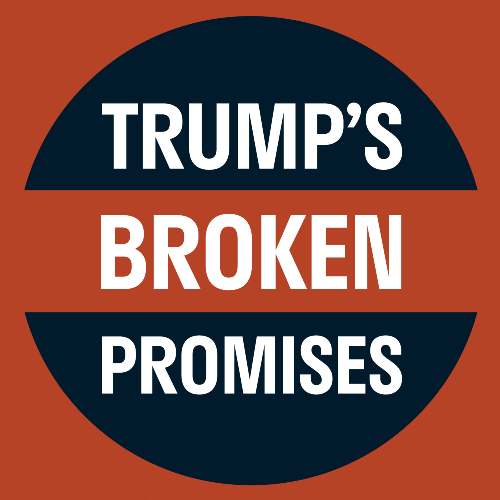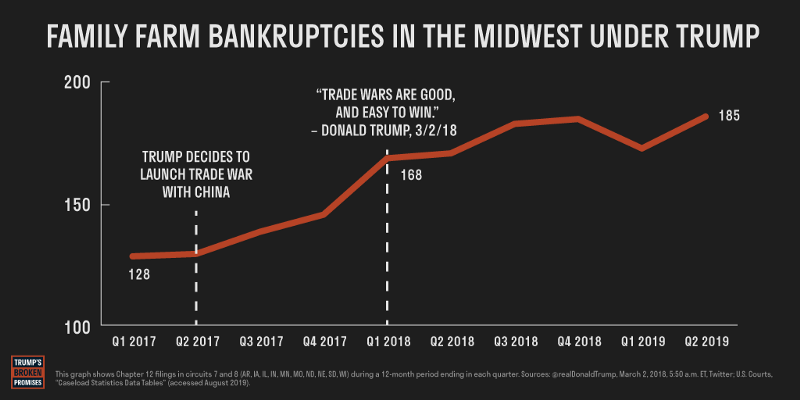
This spring, President Trump argued that “trade wars are good and easy to win,” but his administration’s ad-hoc approach to trade offers no coherent strategy, nor clear end goal. His trade war-by-tweet has not only failed to advance the interests of American industries and workers, but has also sabotaged the nation’s ongoing economic expansion he inherited. The Trump administration’s actions have already cost 300,000 U.S. jobs, and in August, manufacturing activity declined for the first time in three years.
In today’s post, we outline the far-reaching consequences of the Trump administration’s erratic trade dispute, with a focus on the impact in Iowa.
Five Facts
- U.S. manufacturing production growth and export orders have reached their lowest levels since the Great Recession, as American companies’ input costs have increased and access to overseas markets has declined.
- Midwestern states with manufacturing-oriented economies, including Wisconsin, Michigan, and Ohio, have experienced the nation’s largest declines in employment growth this year as a result of the Trump administration’s disruption. In Iowa, manufacturing wage growth has slowed, and industry employees now work an average of 39.5 hours a week, fewer than at any time since the Great Recession.
- Since Trump took office, federal bankruptcy claims for farmers and ranchers in the Midwest have increased by 45%, and in 2018, the number of U.S. farms fell by 12,800 to its lowest level since the Civil War.
- To advantage the fossil fuel industry, the Trump administration recently took action to reduce demand for ethanol and biodiesel, corn- and soybean-based products, causing ethanol prices to plummet and costing Iowa farmers billions of dollars in profit.
- Trump’s trade dispute has not motivated companies to return overseas income and operations to the U.S. as promised. In fact, due to the 2017 tax bill, companies that were supposed to repatriate overseas income actually spent more abroad than in the United States.
Trump’s trade dispute has not motivated companies to return overseas income and operations to the U.S. as promised. In fact, due to the 2017 tax bill, companies that were supposed to repatriate overseas income actually spent more abroad than in the United States.

Trump’s erratic behavior has made it difficult for firms to predict input costs and demand, which has prompted tremendous economic uncertainty. U.S. business confidence has declined steadily since the trade war began — now at its lowest point since Trump took office — and confidence among small businesses has hit its lowest level in 7 years.
As a result, businesses are putting plans on hold
Both U.S. manufacturing production growth and export orders have reached their lowest levels since the depths of the financial crisis in 2009, as the trade dispute raises input costs and restricts American companies’ access to overseas markets. New orders for capital goods have declined from last year, meaning firms are spending less on new equipment and technology.
Midwestern states with manufacturing-oriented economies are bearing the brunt of the Trump administration’s self-inflicted economic downturn. The Fed’s Midwest Economic Index — which measures the region’s growth in manufacturing and consumer spending — has contracted to its lowest level since Trump took office and one of the lowest readings since the depths of the financial crisis. This year, Ohio has lost 9,400 jobs, while Wisconsin has lost 4,200. In Iowa, manufacturing employees are now working fewer hours than at any time since the Great Recession, and industry wage growth has slowed.
Although the Trump administration’s actions have targeted specific products like steel, the consequences of rising costs and limited market access in one industry ripple throughout the supply chain. For every U.S. worker in metal production, there are more than 40 workers in industries that use metal as an input for their products.
American consumers are paying the escalating price of Trump’s tariffs-by-tweet
Studies indicate that companies plan to pass rising input costs onto working-class consumers by raising the price of goods. The Trump administration’s previous rounds of tariffs increased consumer costs by $1.4 billion a month, affecting a wide range of products from household appliances to clothing, According to an NPR study, the overall price of consumer goods has increased by 3% since August 2018, almost double the current rate of inflation. These price increases disproportionately hurt low-income households, who spend a larger share of their income on consumer goods.
The Trump administration’s actions are pushing Iowa farmers to the limit
As other nations retaliate against the U.S. by slapping their own tariffs on American exports, Iowa’s agricultural producers are being elbowed out of critical foreign markets. Iowa’s monthly exports hit a two-year low, and nationwide, farmers have lost an estimated $16 billion in profits this year alone due to the Trump administration’s ad-hoc strategy. Since Trump took office, federal bankruptcy claims for farmers and ranchers have increased by 45% in the Midwest, and farm delinquencies are on the rise as well. In 2018, the number of U.S. farms fell by 12,800 to its lowest level since the Civil War.
To save face with core supporters, the Trump administration has offered to compensate farmers for trade war financial losses through the USDA’s Market Facilitation Program. Trump insisted that China would pay for the tariffs, but the program has shelled out roughly 30% more than the tariffs brought in last year. Iowa is the nation’s second largest agricultural producer, but so far, the state’s farmers have only received 3% of aid payments.
In allocating these aid payments, the Trump administration has disproportionately favored the largest and wealthiest, neglecting family- and minority-owned farms. According to data from the Environmental Working Group, the top 1% of MFP recipients received an average of $183,331, while the bottom 80% received an average of less than $5,000.
With Iowa’s agriculture industry already in distress due to tariffs and historic floods, the Trump administration recently took action to reduce demand for ethanol to instead advantage the fossil fuel industry. By extending Renewable Fuel Standard waivers to oil companies which prevents them from having to blend ethanol and biodiesel into fuel, the Trump administration caused ethanol prices to plummet and costing Iowa farmers billions of dollars in profit. Now, Iowa companies like Siouxland Energy Cooperative and Plymouth Energy are shutting down production and cutting good-paying jobs, leaving the livelihood of Northwest Iowa communities in jeopardy.
The Trump administration’s approach has delivered none of his promised results, only self-inflicted pain
Trump insisted his tit-for-tat tariff hikes would enable the U.S. industries to lure more investment and production away from China. Instead, to avoid the cost of U.S. and Chinese tariffs, companies are simply choosing to purchase goods and services from other countries. U.S. imports from low-wage markets like Vietnam and Malaysia have surged since the trade war began, and our longtime trading partners are doing the same. As a result, the U.S.-China trade deficit has not decreased as Trump promised — it instead reached an all-time high under his watch.
The Trump administration’s trade dispute has not motivated companies to repatriate income or relocate overseas operations to the U.S. as promised. In fact, due to his corporate tax giveaway, companies that were supposed to repatriate overseas income actually invested more abroad than in the United States.
In contrast with the Trump administration’s actions, a trade agenda that actually supports America’s workers and values would address low labor and environmental standards, as well as the race to the bottom for corporate tax rates. To change the trade system to benefit working people, the U.S. needs the very allies that Trump’s erratic behavior is driving away.